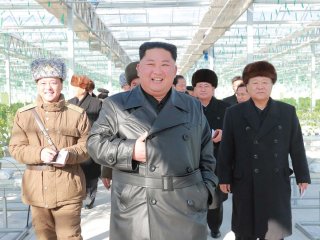Why There Are Few Good Options If Kim Jong-un Were to Die
There is a real danger of infighting, Chinese intervention, or loose nukes.
Editor's Note: This is part of a symposium asking what happens if Kim Jong-un died. To read the other parts of the series click here.
Kim’s death will be when it’s convenient. The North Korean system is a well-oiled machine capable of running for weeks or months without his hands on the tiller of state, so a matter of days is unproblematic. It will barely be noticed. As we’ve seen in the previous two transitions there is a distinct lacuna between passing and proclamation. This issue is succession. Previously there has been an “heir”—and a spare—with Kim Jong-il and Kim Jong-un himself. This time there is neither evidence that there has been any preparation for succession, nor the personnel. Kim’s children can barely walk, let alone reign. We saw the results of regency with Jang Song-thaek. The three options are a smooth internal transfer of power, Beijing capturing and running the North as a new suzerainty, or a vicious and bloody cabal clashes amongst the North’s leadership.
Any succession will be a family and friends affair. Technically—according to the Constitution—the Presidium selects the Party Chairman. Currently, there are only three members, one of which is Kim Jong-un himself. The other two are Pak Pong-ju, the former Premier, who is 81 this week, and the comparatively youthful 70-year-old man from the military Choe Ryong-hae. Choe will play a key role, but will prefer to work behind the scenes rather than center-stage.
Left to their own devices it’s unlikely that Kim Jong-un’s sister Kim Yo-jong has the support base in the Party to survive. Her half-life is measured in months. Young and a woman, she ticks no boxes. For her to succeed is as likely as Ivanka replacing Donald as President. If Beijing—covertly or overtly—intervenes after an appropriate invitation to “save the revolution” seventy years on from their first venture it will be an in-out operation leaving a trusted figure pulling the strings. Both countries would benefit from the comfort blanket of a Kim at the top as the face of the country. Leaving aside the sister, the two more pliable candidates are the brothers. First, there’s Kim Jong-il’s brother Kim Pyong-il (65), who was a North Korean diplomat for forty years based in Eastern Europe and Scandinavia until his final recall last year. Second, there’s Kim Jong-un’s elder brother Kim Jong Chul (39) who is more obsessed with Eric Clapton’s guitar riffs than rifts in the Politburo.
It’s the inter-faction fighting where it gets dangerous. Clearly it’s in the interests of the leadership to protect the current economic and social base. But you don’t always get what you want. In an attempt to triumph amongst the “court” cliques some will lean to Beijing. Leaning to Washington or Seoul will be dangerous at best and only possible if in the last three years the CIA has established any kind of channels. It is not self-evidently the case. In any outside intervention, the Chinese will find it easier going with history and geography on their side. Furthermore, North Korea’s WMD sites are closer to China than the DMZ. Besides, U.S. or South Korean troops would likely meet serious resistance. Then the last best hope would some kind of intervention by the UN Security Council (UNSC) to guarantee no outside interference, thereby allowing the North to fight its succession battle without neighborly involvement.
If it all goes wrong there will be WMDs missing and the South would have ten million North Korean refugees to feed. Maybe for the moment praying for a long life for Kim Jong-un is the prudent option.
Glyn Ford is the Founder and Executive Director of Polint Ltd. He is also a former member of the European Parliament. Image: Reuters


